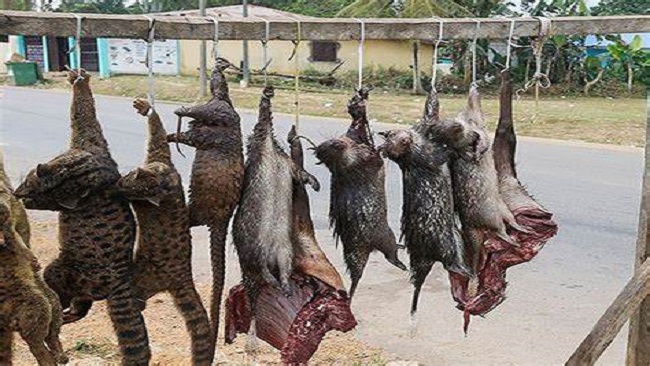Environmental Protection in Cameroon: Just a slogan!
Cameroon, like most countries in the world, has signed many agreements on environmental protection and under those agreements; Cameroon is expected to protect endangered species. However, from every indication, environmental protection in Cameroon is just another slogan designed to please the international community.
Ever since the price of beef went up following the outbreak of violence in Ukraine, Cameroonians have stepped up their consumption of wildlife as an alternative source of animal protein.
In many parts of the country, many “carnivorous” Cameroonians could be seen eating “bush meat” which is considered a delicacy in the country. Unfortunately, not many of them care about the impact of their irresponsible actions on the environment and future generations.
Besides the trade on animals, there is also the danger of felling trees for fuel wood. Many Cameroonian households are incapable of purchasing cooking gas whose price has gone up over the last six months. The use of fuel wood and biomass to cook in Cameroon is altering the country’s landscape and setting the stage for many natural disasters which will hit the country like a ton of bricks.
Climate change is real, but Cameroonians are not worried about its adverse impact. Floods, rising sea levels and fires are threatening lives in many cities and towns in Cameroon. Recently, most coastal towns in Cameroon were flooded after many days of heavy rainfall and not even the government is sensitizing the public on how to mitigate the impact of such disasters.
Cameroon is part of the Convention on international trade in Endangered Species of Wild Fauna and Flora (CITES). To implement and incorporate it into its national laws, Cameroon laid down the National Strategy and Wildlife Control Strategy to regulate the trade and to manage and protect endangered species.
Cameroon also ratified the UN treaty to combat desertification which has been implemented through a National plan to combat Desertification. Cameroon also ratified the UN Convention on the law of the sea and the Fisheries Act as well as the Territorial Waters Act which have been adopted, but partially implemented in real life due to the lack of a political will, lack of expertise and funding.
Lastly, the enforcement of most environmental instruments in Cameroon leaves much to be desired due to some internal and external factors and challenges such as funding, training, corruption, political will, commitment, technology, science and the government’s half-hearted involvement in environmental protection activities in the country
The country is clearly trailing other countries in this regard and political corruption, embezzlement of public funds and the absence of sufficient or adequate structures and infrastructure capable of strengthening and materializing the environmental laws and principles into real and concrete facts with relevant results from an institutional perspective are to blame for the government’s abysmal performance regarding environmental protection.
Similarly, national scientists, researchers, public and private sector lack the means to participate in this process which must be inclusive. The public must also be trained and sensitized on the environmental issues facing the country and this requires financial resources which are unfortunately not available. This unfortunate situation has therefore triggered a vicious circle whereby poverty leads to environmental degradation, and environmental degradation compounds the poverty that is already hurting the population.
By Briyan Tambe Ashu





